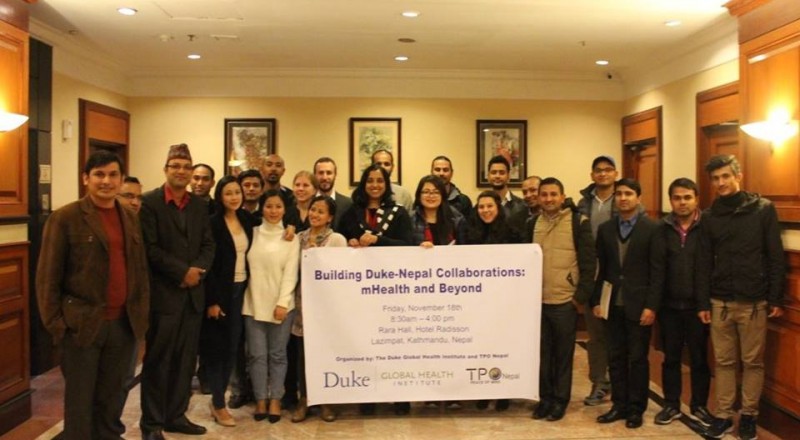Health researchers in Kathmandu recently gathered together to share their ideas and experience about mHealth. The one day symposium on ‘Building Duke Nepal Collaborations: mHealth and Beyond’ was organized by Duke Global Health Institute (DGHI) and Transcultural, Psychological Organization (TPO Nepal) on November 18.
The session was facilitated by Lavanya Vasudevan, Research Scholar, DGHI. The symposium shed light on the global mHealth initiatives, what has been done and how has it helped. In terms of mHealth initiatives in Nepal various organisations Karuna Foundation, Yagiten Pvt. Ltd, Possible Health, GIZ and Medic Mobile shared their experiences and learnings of implementing mHealth in Nepal.
A group session was carried out where the participants were divided in five teams. The teams were asked to share their top three priorities related to global health and the key gaps and challenges in achieving them. Discussions were also held about how supportive will mHealth initiatives be to overcome existing and forthcoming challenges. Governance and management system (health system), non-communicable diseases (NCDs) and human resources for health (health systems) were pointed as some of the top priorities for global health.
The participants pointed out many key gaps and challenges which could be the obstacles/barriers in achieving the priorities related to global health. Various issues related to implementation, policy and research were focused. For the implementation - geography, illiteracy, low level of awareness, unavailability of human resources, and lack of inter-sectoral collaboration were regarded as major challenges. For policy - lack of evidence, qualified policy makers, political influence, lack of monitoring and implementation, lack of technical expertise were pointed. In terms of research - lack of funding for M & E, focus on more ‘academic’ than action oriented research and short-term nature of projects were highlighted.
The need of a strong policy to maintain confidentiality of the data, proper infrastructure were some of the major points which the participants thought should be considered for the implementation of mHealth in Nepal. They also focused on the need of collaboration and learning from other nations They highlighted that academic and NGO collaborations such as that of DGHI and TPO is promising while they also highlighted the need for more government engagement for national ownership of mHealth initiatives.
The symposium is a good start to mainstream mHealth agenda in Nepal with various organizations coming on board. Continuous engagement is required though to ensure the sustainability of such initiatives.



Comments(0)
No comments found.